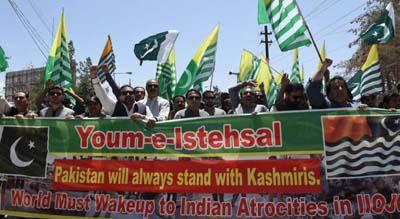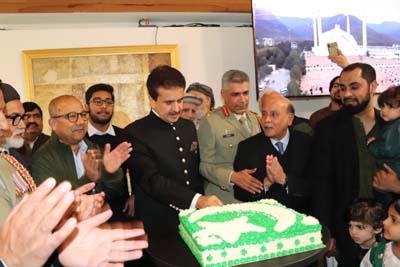
Youm-e-Istehsal-e-Kashmir observed across Australia
Canberra: Youm-e-Istehsal was observed this week across Australia, with multiple events organized across major cities, including Canberra, Sydney, Melbourne, and Brisbane.
Car rallies featuring pictures that expressed support for Kashmiris and their quest for justice and self-determination also gained a lot of public attention.

To commemorate the day, the High Commission for Pakistan in Canberra organised a webinar titled “Youm-e-Istehsal-e-Kashmir: 77 Years of Occupation and Oppression”.
The event featured several distinguished panellists who provided insightful remarks on the situation in the Indian Illegally Occupied Jammu and Kashmir (IIOJK).
The keynote speakers included Honorable Senator David Shoebridge, Honorable Senator Lee Rhiannon, Syed Faiz Naqshbandi, and Professor Samina Yasmeen.
Honorable Senator David Shoebridge, Senator for New South Wales, condemned India’s unilateral and illegal actions of 5 August 2019. He provided a comprehensive overview of the humanitarian situation in IIOJK before and after this date. Senator Shoebridge criticized the Indian attempts to bring about a demographic change in IIOJK that contravenes UNSC resolutions, the 4th Geneva Convention, and international law.
He highlighted that India was trying to convert the Kashmiri people into a minority in their own land by confiscating their property and distributing it to the Indian citizens. He urged Australia to play its role in achieving a fair and just resolution of the IIOJK dispute.
The Honorable Senator Lee Rhiannon, former Senator for New South Wales, remarked on the legal and human rights dimensions of the IIOJK dispute.
She stated that India’s polarizing policies would have long-term implications not only for IIOJK but also for India itself.
Senator Rhiannon urged the international community to call upon India to stop its oppression of the Kashmiri people.
Syed Faiz Naqshbandi, Attorney at Law and Consultant on Human Rights & International Law, described the Indian illegal actions of 5 August as a conspiracy to further deprive the people of IIOJK of their right to self-determination and to perpetuate India’s illegal occupation of Jammu and Kashmir. He emphasized that the people of IIOJK were resilient and would never surrender.
Professor Samina Yasmeen from the University of Western Australia highlighted the broader implications of the IIOJK dispute. She warned that India’s actions would have long-lasting repercussions not only for the region but for the international community as well. She called for a united global effort to address the crisis in IIOJK.
High Commissioner Zahid Hafeez Chaudhri, in his remarks, thanked all the speakers for their valuable contributions. He highlighted the historic role played by Australia in the IIOJK dispute, noting that Australia was a founding member of the United Nations Military
Observer Group in India and Pakistan (UNMOGIP) and that Sir Owen Dixon, the 6th Chief Justice of Australia, was the first UN mediator between India and Pakistan.
He reminded the international community of its obligations to seek just resolution of the Jammu and Kashmir dispute in accordance with the UNSC resolutions and the aspirations of the Kashmiri people.
The High Commissioner also briefed the audience on the ongoing humanitarian crisis in IIOJK. He reiterated that Pakistan would continue to stand shoulder-to-shoulder with its Kashmiri brothers and sisters until the resolution of the IIOJK dispute.
